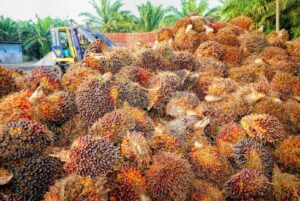
Palm oil business in Nigeria is a thriving industry that holds significant economic potential. With its abundant natural resources and favorable climatic conditions, Nigeria has emerged as a major player in the global palm oil market. In this blog post, we will explore the opportunities and challenges associated with the palm oil business in Nigeria, shedding light on its immense impact on the country’s economy and the steps involved in establishing a successful venture. Join us as we delve into the world of palm oil business in Nigeria and uncover its untapped potential.
Overview of the Palm Oil Business in Nigeria
1. Historical Significance of Palm Oil in Nigeria
The historical significance of palm oil in Nigeria is profound, reflecting its status as a staple commodity that has shaped the nation’s cultural and economic landscape for centuries.
- Cultural Heritage: Palm oil holds deep cultural significance in Nigerian society, with its usage embedded in traditional practices, cuisine, and rituals. Indigenous communities have long revered the oil palm tree as a symbol of fertility, prosperity, and abundance. Its oil has been integral to traditional ceremonies, including weddings, festivals, and spiritual rituals, symbolizing unity, blessings, and hospitality.
- Traditional Medicine: In addition to its cultural symbolism, palm oil has been utilized for its medicinal properties in traditional Nigerian medicine. The oil extracted from the palm fruit is believed to possess healing properties and has been used to treat various ailments, including skin conditions, digestive disorders, and respiratory infections. Its medicinal use underscores the deep-rooted connection between palm oil and indigenous healing practices in Nigerian culture.
- Economic Trade: Palm oil has been a cornerstone of Nigeria’s economic trade for centuries, serving as a valuable commodity for both domestic consumption and international trade. Historically, Nigerian kingdoms and empires, such as the Benin Empire and the Kingdom of Oyo, engaged in palm oil production and trade networks, exporting the commodity to neighboring regions and beyond. The lucrative trade in palm oil facilitated economic growth, wealth accumulation, and cultural exchange, contributing to the prosperity of Nigerian societies.
- Colonial Legacy: During the colonial era, palm oil emerged as a key commodity in Nigeria’s trade relations with European powers. The demand for palm oil as a lubricant, cooking oil, and industrial ingredient drove increased production and exportation. However, the colonial administration’s imposition of exploitative systems, such as the palm oil tax and forced labor, inflicted hardships on local palm oil producers and disrupted traditional palm oil production practices.
- Independence and National Identity: Following Nigeria’s independence in 1960, palm oil retained its significance as a symbol of national identity and economic potential. The government recognized the importance of the palm oil industry for economic development and embarked on initiatives to modernize production methods, expand cultivation areas, and promote agricultural research and extension services. Palm oil continued to play a central role in Nigeria’s quest for economic self-sufficiency and industrialization, contributing to the nation’s efforts to diversify its economy and reduce dependence on oil exports.

2. Current State of the Palm Oil Industry
The current state of the palm oil industry in Nigeria reflects a dynamic and multifaceted sector that continues to play a crucial role in the nation’s economy. Here’s an overview:
- Production Capacity: Nigeria is one of the world’s leading producers of palm oil, with an estimated annual production of over 1.5 million metric tons. The country’s vast land resources and favorable climate conditions make it well-suited for oil palm cultivation, particularly in the southern and southwestern regions.
- Market Share: Nigeria’s palm oil industry accounts for a significant share of the global palm oil market, contributing to both domestic consumption and international trade. The country exports palm oil to various destinations, including Asia, Europe, and neighboring African countries, while also meeting domestic demand for cooking oil, industrial applications, and consumer products.
- Smallholder Dominance: While large-scale plantations exist in Nigeria, smallholder farmers play a dominant role in palm oil production, cultivating the majority of oil palm plantations across the country. Smallholder farming systems contribute to employment generation, rural livelihoods, and poverty alleviation, empowering local communities and fostering inclusive growth.
- Processing Infrastructure: Nigeria’s palm oil processing sector comprises a network of mills, refineries, and processing facilities, ranging from small-scale artisanal units to large industrial complexes. These facilities process fresh palm fruit into crude palm oil (CPO) and palm kernel oil (PKO), which are used in various industries, including food, cosmetics, and biofuels.
- Investment Opportunities: The palm oil industry presents attractive investment opportunities for both domestic and foreign investors, driven by increasing global demand for vegetable oils, population growth, and rising incomes. Government incentives, such as tax breaks, land allocation, and credit facilities, encourage investment in palm oil production, processing, and value addition.
- Environmental Challenges: Despite its economic significance, the palm oil industry in Nigeria faces environmental challenges, including deforestation, land degradation, and biodiversity loss. Unsustainable cultivation practices, such as land clearance through slash-and-burn methods, contribute to environmental degradation and climate change, prompting calls for sustainable land management and conservation measures.
- Regulatory Framework: The Nigerian government has implemented policies and regulations to govern the palm oil industry, including land-use planning, environmental regulations, and quality standards for palm oil products. Regulatory frameworks aim to promote sustainable practices, improve productivity, and enhance the competitiveness of Nigerian palm oil in domestic and international markets.
- Research and Development: Research institutions, universities, and agricultural agencies in Nigeria are actively engaged in research and development (R&D) initiatives to enhance palm oil production, processing efficiency, and value addition. R&D efforts focus on breeding high-yielding oil palm varieties, improving agronomic practices, and developing innovative technologies for sustainable palm oil production.

3. Major Players in the Nigerian Palm Oil Business
The Nigerian palm oil business encompasses a diverse array of stakeholders, ranging from smallholder farmers to large-scale corporations. Here are the major players shaping the industry:
- Smallholder Farmers: Smallholder farmers constitute a significant segment of the Nigerian palm oil industry, cultivating oil palm plantations on family-owned or communal lands. These farmers often operate on a subsistence basis, contributing to local production and livelihoods in rural communities. Smallholder farming systems are characterized by traditional cultivation methods and manual processing techniques.
- Large-scale Plantations: Several large-scale plantation companies operate in Nigeria, managing extensive oil palm estates and commercial production units. These companies invest in mechanized farming techniques, modern processing facilities, and value-added activities along the palm oil value chain. Large-scale plantations contribute to commercial production, export earnings, and employment generation in the palm oil sector.
- Palm Oil Processors and Refiners: Palm oil processing and refining companies play a critical role in converting fresh palm fruit into crude palm oil (CPO) and palm kernel oil (PKO), which are essential ingredients in various industries. These companies operate processing mills, refineries, and extraction plants, utilizing advanced technology and quality control measures to produce refined palm oil products for domestic and international markets.
- Traders and Distributors: Traders and distributors form an integral part of the palm oil supply chain, facilitating the movement of palm oil products from producers to consumers. These stakeholders engage in buying, selling, and transporting palm oil within Nigeria and across borders, contributing to market liquidity, price stability, and product availability.
- Government Agencies and Regulatory Bodies: Government agencies and regulatory bodies oversee the palm oil industry in Nigeria, enacting policies, regulations, and standards to promote sustainable practices, ensure food safety, and regulate trade. Agencies such as the Nigerian Institute for Oil Palm Research (NIFOR) and the Standards Organization of Nigeria (SON) provide research, extension services, and quality assurance support to stakeholders in the palm oil sector.
- Industry Associations and Cooperatives: Industry associations and cooperatives represent the collective interests of palm oil stakeholders, fostering collaboration, advocacy, and capacity building within the sector. These organizations provide platforms for knowledge sharing, market access, and policy engagement, empowering members to address common challenges and capitalize on opportunities in the palm oil business.
- Investors and Financial Institutions: Investors and financial institutions play a crucial role in financing palm oil projects, providing capital, loans, and investment opportunities to support production, processing, and value addition initiatives. Private equity firms, venture capitalists, and development banks contribute to industry growth by funding infrastructure development, technology adoption, and market expansion in the Nigerian palm oil sector.
Benefits and Challenges of the Palm Oil Business
1. Economic Opportunities
The palm oil business in Nigeria presents a plethora of economic opportunities across various segments of the value chain. Here are some key economic benefits associated with the industry:
- Employment Generation: The palm oil sector is a significant source of employment, particularly in rural areas where most oil palm plantations are located. Smallholder farmers, plantation workers, processing mill staff, transporters, traders, and other stakeholders contribute to job creation, livelihood enhancement, and poverty reduction.
- Income Generation: Palm oil cultivation and processing provide opportunities for income generation and wealth creation, especially for smallholder farmers and rural communities. By monetizing land resources and agricultural produce, farmers can generate revenue from palm oil sales, enabling them to improve their standard of living, invest in education, healthcare, and other essential needs.
- Foreign Exchange Earnings: Nigeria’s palm oil exports contribute to foreign exchange earnings, bolstering the country’s trade balance and external reserves. As a globally recognized commodity, palm oil attracts demand from international markets, allowing Nigeria to earn revenue through exports to countries in Asia, Europe, and Africa.
- Poverty Alleviation: The palm oil industry plays a crucial role in poverty alleviation and rural development, providing opportunities for marginalized communities to participate in agricultural value chains and income-generating activities. By empowering smallholder farmers and promoting inclusive growth, the industry helps reduce poverty, inequality, and social exclusion in Nigeria.
- Value Addition and Industrialization: Palm oil serves as a versatile raw material for various industries, including food, cosmetics, pharmaceuticals, and biofuels. Value addition activities such as refining, fractionation, and product diversification enhance the economic value of palm oil products, stimulating downstream industries and promoting industrialization.
- Infrastructure Development: Investment in palm oil production and processing infrastructure contributes to infrastructure development in rural areas, including roads, storage facilities, electricity supply, and water resources management. Improved infrastructure enhances the efficiency of agricultural operations, reduces post-harvest losses, and facilitates market access for farmers and entrepreneurs.
- Revenue Generation: Government revenue from the palm oil industry comes in the form of taxes, levies, and royalties collected from producers, processors, traders, and other stakeholders. Revenue generated from the palm oil sector can be reinvested in agricultural research, extension services, rural infrastructure, and social welfare programs, supporting sustainable development goals and national economic growth.
2. Environmental Impact
The palm oil business in Nigeria, like in many other countries, has significant environmental impacts that require careful consideration and sustainable management practices. Here are some key environmental considerations associated with the palm oil industry in Nigeria:
- Deforestation and Habitat Loss: The expansion of oil palm plantations often leads to deforestation and habitat loss, particularly in ecologically sensitive areas such as rainforests and high conservation value forests. Clearing land for palm oil cultivation can result in the destruction of biodiverse ecosystems, loss of wildlife habitat, and fragmentation of forest landscapes, threatening species diversity and ecosystem resilience.
- Biodiversity Decline: Deforestation and habitat conversion for palm oil production contribute to the loss of biodiversity, including native flora and fauna species. The conversion of natural habitats into monoculture plantations reduces habitat availability for wildlife, disrupts ecological processes, and increases the risk of species extinction, particularly for forest-dependent species such as orangutans, elephants, and tigers.
- Soil Degradation: Intensive oil palm cultivation practices, such as monocropping and heavy use of agrochemicals, can degrade soil quality and fertility over time. Soil erosion, compaction, nutrient depletion, and loss of soil organic matter are common consequences of unsustainable land management practices, leading to reduced agricultural productivity and long-term environmental degradation.
- Water Pollution: The use of agrochemicals, such as fertilizers and pesticides, in palm oil cultivation can contaminate water bodies, including rivers, streams, and groundwater sources. Runoff from plantations carries pollutants into aquatic ecosystems, disrupting water quality, harming aquatic organisms, and posing risks to human health and livelihoods, particularly for communities dependent on freshwater resources for drinking, fishing, and irrigation.
- Greenhouse Gas Emissions: Land-use change and forest conversion for palm oil production contribute to greenhouse gas emissions, primarily through the release of carbon dioxide (CO2) from deforestation and peatland drainage. The conversion of carbon-rich ecosystems, such as peatlands and tropical forests, into oil palm plantations results in carbon stock depletion and contributes to global climate change, exacerbating the impacts of deforestation and land degradation.
- Social Impacts: Environmental degradation resulting from unsustainable palm oil practices can have social consequences, including land conflicts, displacement of indigenous communities, loss of cultural heritage, and degradation of traditional livelihoods. Addressing environmental concerns in the palm oil sector requires a holistic approach that considers the interlinkages between environmental conservation, social equity, and economic development.
3. Government Initiatives and Policies
The Nigerian government has implemented various initiatives and policies to regulate and promote sustainability within the palm oil industry. These initiatives aim to address environmental concerns, enhance productivity, ensure food security, and stimulate economic growth. Here are some key government interventions and policies related to the palm oil business in Nigeria:
- National Oil Palm Development Program (NOPDP): The National Oil Palm Development Program is a government initiative aimed at revitalizing the palm oil sector in Nigeria. Launched by the Federal Ministry of Agriculture and Rural Development (FMARD), NOPDP focuses on increasing oil palm production, enhancing value addition, and promoting smallholder participation through capacity building, access to inputs, and technology transfer.
- National Palm Oil Policy: The Nigerian government has formulated a National Palm Oil Policy to guide the development of the palm oil industry and promote sustainable practices. The policy framework outlines strategies for land allocation, research and development, extension services, infrastructure development, and market access to support the growth of the palm oil sector while addressing environmental and social concerns.
- Land-Use Planning and Regulation: The government regulates land-use planning and allocation for oil palm cultivation to prevent deforestation, biodiversity loss, and land conflicts. Regulatory frameworks govern land acquisition, land tenure rights, environmental impact assessments, and land-use zoning to ensure sustainable land management practices and minimize adverse impacts on ecosystems and local communities.
- Environmental Regulations: Environmental regulations and standards are enforced to mitigate the environmental impacts of palm oil production and processing activities. Regulatory measures address issues such as deforestation, soil erosion, water pollution, and greenhouse gas emissions through compliance requirements, monitoring mechanisms, and enforcement actions to promote environmental conservation and biodiversity protection.
- Quality Standards and Certification: The Nigerian government collaborates with industry stakeholders to establish quality standards and certification schemes for palm oil products. Standards ensure product quality, safety, and traceability, while certification schemes, such as the Nigerian Sustainable Palm Oil (NSPO) initiative and international standards like the Roundtable on Sustainable Palm Oil (RSPO), promote sustainable practices, ethical sourcing, and market access for certified palm oil producers.
- Research and Development Support: Government agencies, such as the Nigerian Institute for Oil Palm Research (NIFOR) and agricultural research institutes, receive funding and support for research and development (R&D) initiatives in the palm oil sector. R&D efforts focus on breeding high-yielding oil palm varieties, developing sustainable cultivation practices, improving processing technologies, and enhancing value addition to boost productivity and competitiveness.
- Incentives and Support Programs: The government provides incentives, subsidies, and support programs to encourage investment and innovation in the palm oil industry. Incentives may include tax breaks, grants, credit facilities, and infrastructure development assistance to stimulate private sector participation, attract foreign investment, and facilitate the growth of downstream industries in the palm oil value chain.
Steps to Start a Palm Oil Business in Nigeria

Success Stories in the Nigerian Palm Oil Industry
Conclusion
In conclusion, the palm oil business in Nigeria holds great historical significance and continues to play a crucial role in the country’s economy. Despite facing challenges, the industry has seen significant growth and development. Key players in the Nigerian palm oil business include large-scale plantations and smallholder farmers. The industry offers various benefits, such as job creation and export opportunities, but also poses challenges related to sustainability and environmental concerns.
For those interested in starting a palm oil business in Nigeria, it is essential to follow specific steps and best practices. Success stories within the Nigerian palm oil industry inspire and showcase the potential for growth and profitability. We encourage you to share your thoughts and insights by leaving a comment on this blog post.
Submitted by ADE for Naijatipsland.











